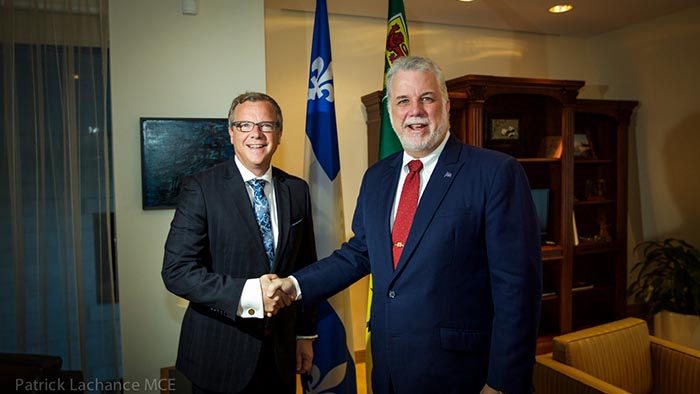Released on June 16, 2016
Philippe Couillard, Premier of Québec, and Brad Wall, Premier of Saskatchewan, have agreed to expand their collaborative relationship to further develop the potential of carbon capture and storage (CCS) —a technology aimed at enabling major emitters to reduce their greenhouse gas (GHG) emissions.The collaboration announced today will contribute to the development of knowledge and best practices to reduce GHG emissions through carbon capture and storage while improving the economic return on projects by reusing the captured carbon for other purposes.
- Specifically, the two provinces have agreed to accelerate the development and deployment of CCS technologies;
- Exchange updates and information on CCS projects and technologies;
- Work together to explore opportunities of further collaborations, notably with the recently established BHP Billiton SaskPower CCS Knowledge Centre.
“We have put in place a cap and trade mechanism in Québec, an instrument recognized throughout the world to fight climate change and reduce GHGs while fostering innovation in green technologies,” Couillard said. “To ensure our prosperity and the competitiveness of our companies, we also need that innovation be introduced
in all sectors, especially with new ways to reduce GHGs emitted by production activities. The world economy is transformed and states should create an environment conducive to investment, knowing that fighting climate change is a factor of increased competitiveness. Saskatchewan has expertise in carbon capture and storage
that our companies could benefit from. What is good for the economy can also be good for the environment."

“Innovation and the development of clean technology options have great potential to help address climate change worldwide,” Wall said. “Saskatchewan’s leadership in carbon capture and storage shows that we can be part of the global solution in addressing climate change, by focussing on the development of practical technologies, without adversely impacting our economy.”
Over the years, Saskatchewan has developed expertise in carbon dioxide capture and storage methods. Québec is also interested in these technologies and is making significant investments into innovation and research, particularly through its 2013-2020 Climate Change Action Plan.
It should be noted that as part of Québec’s 2016-2017 Budget, $15 million over three years has been specifically allocated for the creation of the Valorisation Carbone Québec valuation consortium, which will bring together Québec public- and private-sector organizations specialized in this field. The mandate of this consortium is to develop and implement concrete solutions to capture and reuse CO2 in applications that are crucial to Québec’s economy—the conversion of biofuels, the production of reinforced concrete, and enhanced hydrocarbon recovery, in particular.
Carbon capture and storage technology has been recognized by the United Nations Intergovernmental Panel on Climate Change and the International Energy Agency as a tool in achieving the global goal of limiting temperature increases to 2°C. Technologies like carbon capture and storage will thus be important in helping achieve climate change goals.
SaskPower’s Boundary Dam 3 (BD3) is the world’s first and largest coal-fired integrated commercial scale carbon capture system. BD3 provides electricity for 100,000 homes and does so 10 times more cleanly than other coal units and three times cleaner than a comparable natural gas unit. BD3 has been in operation since October 2014.
-30-
For more information, contact:
Harold Fortin
Cabinet du premier ministre du Québec
Quebec City
Phone: 418 643-5321
Email: harold.fortin@mce.gouv.qc.ca
Kathy Young
Executive Council
Regina
Phone: 306-787-0425
Email: Kathy.young@gov.sk.ca
Cell: 306-526-8927
